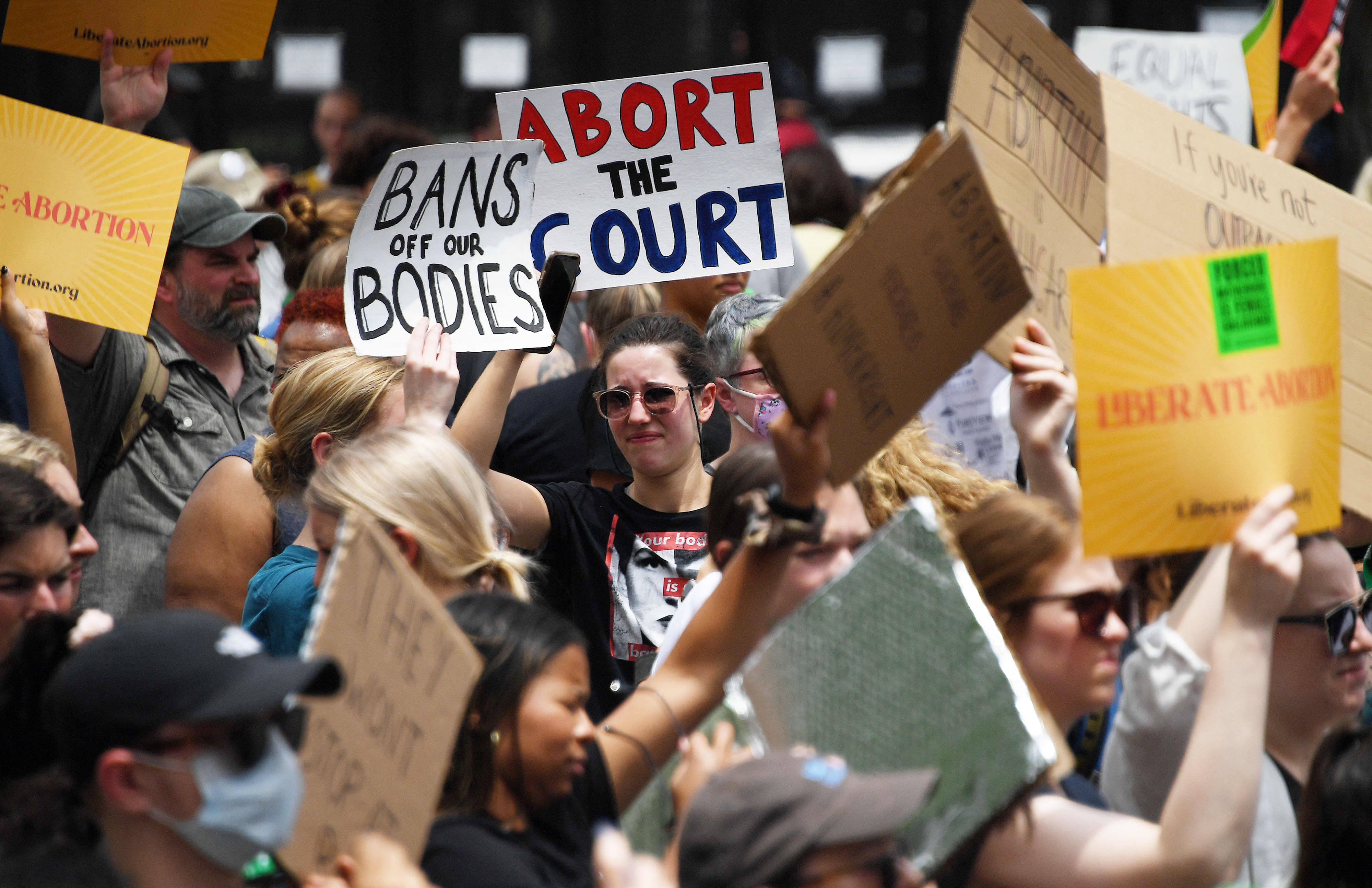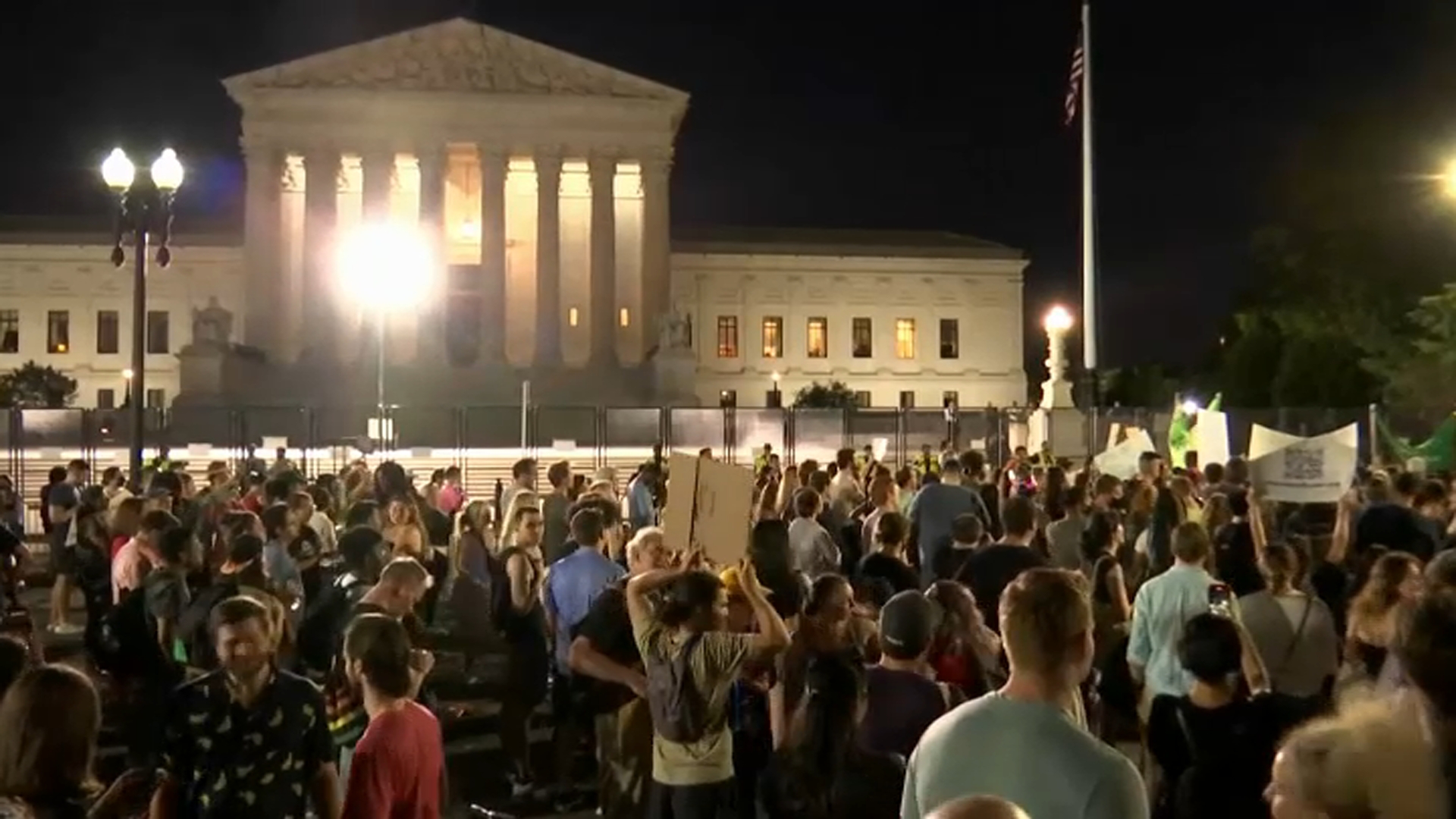The U.S. Supreme Court on Friday overturned Roe v. Wade, the 1973 decision that had provided a constitutional right to abortion. The ruling is expected to lead to abortion bans in roughly half the states.
In anticipation of the decision, several states led by Democrats have taken steps to protect abortion access.
The decision also sets up the potential for legal fights between the states over whether providers and those who help women obtain abortions can be sued or prosecuted.
Get New England news, weather forecasts and entertainment stories to your inbox. Sign up for NECN newsletters.
Here is an overview of abortion legislation and the expected impact of the court's decision in every state in New England.
MASSACHUSETTS
Political control: The Democrats who control the Massachusetts Legislature support access to abortion, as does the state’s Republican governor, although they differ on specific policies.
Background: Massachusetts once had a contentious relationship with abortion, in part due to the powerful influence of the Catholic Church, which opposes abortion. In recent years, that influence has waned and Massachusetts has become a strong supporter of abortion rights. In 2018, in anticipation of a conservative tilt on the U.S. Supreme Court, the state removed an 1845 abortion ban from its books that was not enforced. Two years later, Democratic state lawmakers clashed with Republican Gov. Charlie Baker -- who says he supports abortion rights -- over an effort to codify abortion rights into state law, allow abortions after 24 weeks of pregnancy in cases where the child would not survive after birth, and lower from 18 to 16 the age at which women could seek an abortion without consent from a parent or guardian. Lawmakers passed the bill -- dubbed the Roe Act -- over Baker’s veto.
Effect of Supreme Court ruling: Baker has vowed to fight to keep abortion legal in Massachusetts and on Friday issued an executive order protecting access to reproductive care in the state, but it is his last year in office. The last remaining Democratic candidate for governor, Attorney General Maura Healey, supports abortion rights. Republican candidate Geoff Diehl said he believes in “the need to protect human life wherever and whenever possible.” Fellow GOP candidate Chris Doughty said he would “not seek any changes to our state’s abortion laws.”
What’s next: Absent new federal abortion laws, there’s little chance Massachusetts will restrict abortion rights. As of 2017, there were 47 facilities providing abortion in Massachusetts, 19 of those were clinics, according to the Guttmacher Institute, which supports abortion rights. If Roe v. Wade is overturned, it’s unclear how many people would travel there from states that ban or restrict abortion. The state Senate has proposed additional money to help maintain access to abortion services, including barring providers and patients from being extradited to other states to face abortion-related lawsuits.
Get updates on what's happening in New England to your inbox. Sign up for our News Headlines newsletter.
NEW HAMPSHIRE
Political control: New Hampshire has a Republican governor and the GOP controls the 424-member Legislature. All face reelection this fall.
Background: Any abortion restrictions New Hampshire had on the books before Roe v. Wade were not enforced after the landmark 1973 ruling, and they were repealed altogether in 1997. The state had no restrictions until January, when a ban on abortion after 24 weeks of pregnancy was enacted. In June, an exemption was added for cases in which the fetus has been diagnosed with “abnormalities incompatible with life.” Anticipating the Supreme Court action, Democrats this year tried unsuccessfully to enshrine abortion rights into state law and the state constitution. Gov. Chris Sununu calls himself pro-choice and says he is committed to upholding Roe v. Wade, but he also has boasted “I’ve done more on the pro-life issue than anyone.”
Effect of Supreme Court ruling: Nothing will change immediately in New Hampshire. The Legislature won’t return until fall, when there will be a one-day session to take up vetoed bills, and it would take a two-thirds majority vote to introduce new legislation then.
What’s next: The majority leader of the New Hampshire House has said the public should not expect Republicans in the Legislature to further tighten state abortion laws. But anti-abortion lawmakers who have filed bills in the past are expected to try again.
MAINE
Political control: Both chambers of the Maine Legislature, which has adjourned, are controlled by Democrats. Democratic Gov. Janet Mills has vowed to protect the right to an abortion, saying she will “fight with everything I have to protect reproductive rights.”
Background: A Republican governor in 1993 signed a Maine law affirming the right to abortion before a fetus is viable. After that, abortion is only allowed if the life or health of the mother is at risk, or if the pregnancy is no longer viable. In 2019, lawmakers eliminated a physician-only rule and Mills signed it into law, allowing nurse practitioners, physician assistants and other medical professionals to perform abortions.
More on the end of Roe v. Wade
Effect of Supreme Court ruling: Nothing will change in Maine, and that will be true even if the court merely upholds Mississippi’s ban at 15 weeks without explicitly overturning Roe. Any attempt to restrict abortions when lawmakers reconvene next year would face fierce pushback. Abortion providers, meanwhile, said there could be an influx of patients seeking abortions from states that outlaw the procedure.
What’s next: Any major changes are unlikely unless former Gov. Paul LePage, a Republican, unseats Mills and Republicans take control of both chambers of the Legislature in November. LePage, a Catholic who opposes abortion rights, has said it’s up to lawmakers to address the abortion issue as they see fit.
VERMONT
Political control: The Vermont Legislature is controlled by Democrats, but Republican Gov. Phil Scott is a firm supporter of abortion rights.
Background: Vermont has a 2019 law guaranteeing the right to an abortion and voters will consider a proposal in November to amend the state constitution to protect abortion rights. Also in 2019, the Vermont Legislature began the process of amending the constitution to protect abortion rights, known as the Reproductive Liberty Amendment or Proposition 5. Vermont’s proposed amendment does not contain the word “abortion.” Proponents say that’s because it’s not meant to authorize only abortion but also would guarantee other reproductive rights such as the right to get pregnant or access birth control. Opponents say vague wording could have unintended consequences that could play out for years. Lawmakers approved the proposed amendment in February, leading the way for a statewide vote.
Effect of Supreme Court ruling: Nothing will change immediately in Vermont.
What’s next: Vermont voters will cast ballots in November to decide if the state will amend its constitution to protect abortion rights.
RHODE ISLAND
Political control: The Democrats who control Rhode Island’s General Assembly support access to abortion, as does the Democratic governor.
Background: Rhode Island’s governor signed legislation in 2019 to enshrine abortion protections in case the U.S. Supreme Court overturned its 1973 decision in Roe v. Wade. The law says the state will not restrict the right to an abortion prior to fetal viability or after if necessary to protect the health or life of the pregnant woman. It repealed older laws deemed unconstitutional by the courts. The Rhode Island Supreme Court upheld the 2019 law in May, just two days after the Supreme Court draft opinion was leaked suggesting that a majority of the justices were prepared to overturn Roe. Abortion opponents had argued the law violates the state constitution. In 2020, there were 2,611 abortions in Rhode Island, according to the state health department.
Effect of Supreme Court ruling: Rhode Island’s attorney general believes the 2019 Reproductive Privacy Act will continue to protect access to abortion if Roe is overturned. Planned Parenthood Votes! Rhode Island also said abortion will remain legal regardless of the decision because the right was codified in state law.
What’s next: It’s possible Rhode Island may need to act to protect abortion access for non-resident patients, but that cannot be debated in the legislature until next year’s legislative session. Lawmakers may consider requests for abortion coverage to be added to Rhode Island’s Medicaid program and insurance coverage for state employees.
CONNECTICUT
Political control: Democrats who control the Connecticut General Assembly support access to abortion, as does the state’s Democratic governor.
Background: Connecticut passed a law in 1990 giving women the legal right to abortion. Having passed with strong bipartisan support, it was lauded at the time for being a rare compromise between abortion rights advocates and opponents. It affirmed a woman’s unqualified right to an abortion “prior to viability of the fetus,” as well as later-term abortions “necessary to preserve the life and health of the pregnant woman.” It also repealed state laws predating Roe v. Wade that had made it a felony to have an abortion or to perform one and required that patients under 16 receive counseling about their options. This year, Gov. Ned Lamont signed legislation to protect medical providers and patients from out-of-state legal actions. The same law allows advanced practice registered nurses, nurse-midwives or physician assistants to perform aspiration abortions in the first 12 weeks of a pregnancy.
Effect of Supreme Court ruling: Connecticut Attorney General William Tong, a Democrat, has vowed to challenge any attempt to nullify Connecticut’s abortion rights law. “Let’s not mince words. They will come for us,” Tong warned abortion rights supporters during a recent news conference. “We will fight that effort tooth-and-nail. Any court, any place, Connecticut will be there and will fight.” The state is already involved in major abortion cases across the country. And while Connecticut is surrounded by mostly pro-abortion states, it’s still bracing for out-of-state patients seeking abortions if Roe is overturned.
What’s next: Connecticut’s new law protecting abortion providers from other states’ bans takes effect on July 1. It creates a legal cause of action for providers and others sued in another state, enabling them to recover certain legal costs. It also limits the governor’s discretion to extradite someone accused of performing an abortion, as well as participation by Connecticut courts and agencies in those lawsuits. There’s discussion of possibly amending the state’s constitution to enshrine the right to abortion, making it more difficult to overturn, but that would be a multi-year process.



